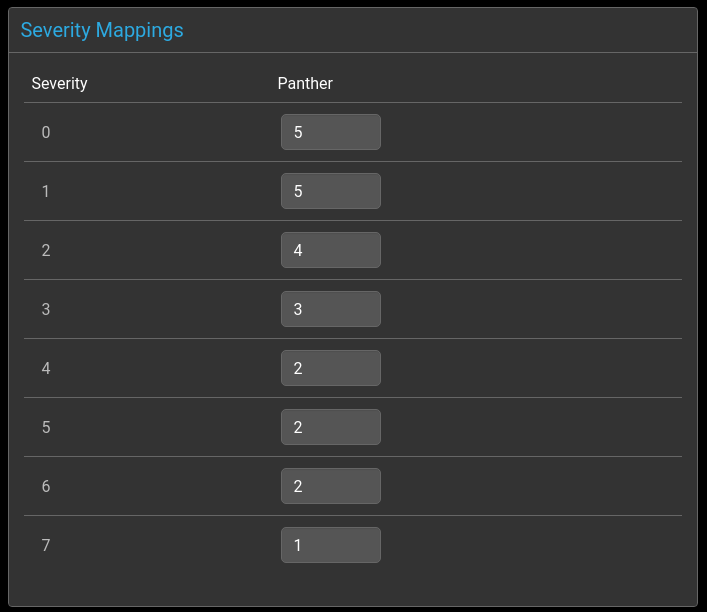Overview
There are two Panther event receivers:
- Syslog
- HTTP
Events flow through each agent before being processed by the global and group rules.
Agent Rules
These are common to all agents
Default Event Identifier

The event’s identifier field uniquely identifies an event in the console.
By default this is created by combining the node, severity, tag and summary fields:
{node}:{severity}:{tag}:{summary}
Any events with a matching identifier will be grouped together, and the corresponding event tally will increase by 1.
If no matching event identifier is found, then a new event is created.
Timestamps are also stored for each event.
Please note that when events are deduplicated via the
identifierfield, some information may be lost. For example, the PID of a process can change regularly, but is not included in the identifier by default, so multiple PIDs may aggregate into a single event.
Field Mapping

Field Transformers

The transforms allow pre-defined functions to be applied to event console fields before rules processing takes place.
Currently supported transformations are
| Transformation | Description |
|---|---|
| Lower Case | lowercases a field value |
| Upper Case | uppercases a field value |
| Left Trim | Trims whitespace on the left |
| Right Trim | Trims whitespace on the right |
Agent Specific - Syslog
Syslog message fields need to be mapped to event console fields. These fields will then be available for matching in rules processing.
Currently supported fields are as follows:
Common to all Syslog messages
| Field | Example |
|---|---|
prival | <PRIVAL> |
facilityID | |
severityID | |
facility | local2 |
severity | warn |
type |
RFC5424, RFC3164
|
time | 2022-07-04T16:24:41.786Z |
host | localhost |
appName | sshd |
message | User authentication |
msgid | <MSGID> |
pid | <PROCID> |
Additional fields for RFC5424
Note structuredData.timeQuality.* fields are optional, but commonly used. Please refer to you Syslog generators documentation.
| Field | Example |
|---|---|
structuredData.timeQuality.tzKnown | 1 |
structuredData.timeQuality.isSynced | 1 |
structuredData.timeQuality.syncAccuracy | 531000 |
structuredData.<SD-ID>.<PARAM-NAME> | <PARAM-VALUE> |
Example of sending an RFC5424 message
Note Older implementations of logger may lack the --rfc5424 flag, such as CentOS 7.
logger -p local2.warn -n localhost -T -P 1514 --rfc5424 -t sshd --msgid 1234 --id=44 --sd-id test@123 --sd-param foo=\"bar\" --sd-id more@456 --sd-param fiz=\"baz\" hello world
Would make the following fields and values accessible with the Syslog rules:
| Field | Value |
|---|---|
prival | 148 |
facilityID | 18 |
severityID | 4 |
facility | local2 |
severity | warn |
type | RFC5424 |
time | 2022-07-04T16:24:41.786Z |
host | localhost |
appName | sshd |
message | hello world |
msgid | 1234 |
pid | 44 |
structuredData.timeQuality.tzKnown | 1 |
structuredData.timeQuality.isSynced | 1 |
structuredData.timeQuality.syncAccuracy | 531000 |
structuredData.test@123.foo | bar |
structuredData.more@456.fiz | baz |
Differentiating between RFC3164 and RFC5424 messages
In order to selectively handle the two message formats, you can use an additional selector, such as:
- name: This is a Syslog RFC3164 message
eq:
input.type: RFC3164
set:
summary: 'This message was formatted as RFC3164'
agent: 'Syslog {input.type}'
- name: This is a Syslog RFC5424 message
eq:
input.type: RFC5424
set:
summary: 'This message was formatted as RFC5424'
agent: 'Syslog {input.type}'
external_id: '{input.msgID}'
For RFC5424 formatted messages it may also be useful to select based on the availability of structuredData elements, with the following:
- name: This is a Syslog RFC5424 message with structuredData
eq:
input.type: RFC5424
field_exists:
- structuredData.test@123.foo
set:
summary: 'This message was formatted as RFC5424 and has structuredData test@123 is {structuredData.test@123.foo}'
agent: 'Syslog {input.type}'
Severity Mapping

Syslog logging levels need to be mapped to event console severities as there is not a one to one relationship between them, and the scale is also inverted.
Syslog levels are defined from 7 (debug) to 0 (emergency).
Panther severities are from 5 (critical) to 0 (clear).

By default, events with severity 0 will be periodically removed from the list of event logs in the console.
Agent Specific - HTTP
Sending events via the HTTP API requires sending a JSON payload that minimally conforms to the following structure
Note severity is an integer from 0 to 5
{
"event: {
"node": "hostname",
"tag": "some string",
"summary": "what the event pertains too",
"severity": 3
}
}
In addition to the above, extra fields can be included within the event: {} object.
Note They must be of String types.
Given the following JSON payload:
{
"event" {
"node": "hostname", "tag": "some string", "summary": "what the event pertains too", "severity": 3,
"extra1": "An additional extra field",
"extra2": "Agent Smith",
}
}
These additional fields can be referenced within the agent http.rules.yml, such as:
agent:
rules:
- name: appends extra1 to the summary
field_exists:
- "extra1"
set:
summary: '{summary} + {extra1}'
agent: '{extra2}'